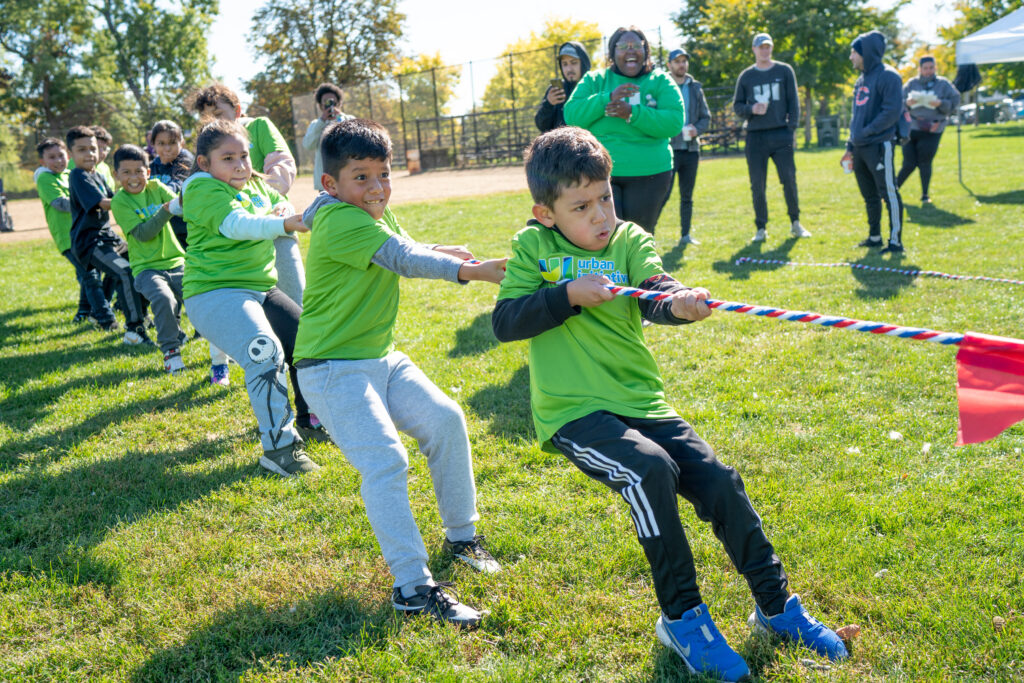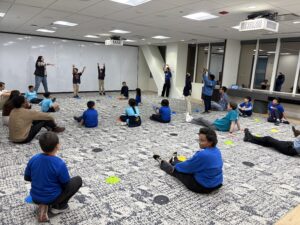Lunch wraps up, and you throw away your trash and stow your tray on a conveyer belt at the back of the cafeteria. You thank the kitchen staff, and then you stand in line at the doors. Kids all around you pulse with energy and excitement for what’s next. When the doors open, there’s a gust of cool fall air, and you move as fast as is allowed to get to the playground.
For many of us, recess was a sacred time. It was space for rest and a reprieve from the school day. In the last two years, as many retreated to home offices and craved a break in the day, we returned to this ritual of stepping outside, moving our bodies, and taking a walk at lunchtime. For those that cherished this time in our day throughout our childhoods, you can feel the intrinsic value of recess. But for many schools and youth, the magic of recess has been lost. Adjustments to the school day have pared down recess or eliminated it altogether. Often, recess lacks quality opportunities for play, connection, learning, and a crucial break from the academic day.
Urban Initiatives seeks to fill this gap and make recess impactful for every student in our school communities. Our recess program creates genuine value during recess through improved physical activity, social emotional learning opportunities, and healing-centered community building. It is a vital break from the demands of the academic day. We provide highly-trained staff that maximizes impact by implementing active, safe, restorative, and fun recess every day.
Unlike traditional recess, where youth are merely supervised and may self-select into games, walking, talking, or doing nothing at all, UI recess program guarantees that youth participate in 15 minutes of active play each day. Our coaches are trained in indoor and outdoor games that offer students opportunities for facilitated activity or self-directed play. There are ample opportunities for social emotional learning skill development. Urban Initiatives’ recess is inclusive.
Recess and play within a school community is often viewed as a privilege – one that is frequently the first to be lost when youth break rules and overstep boundaries. Urban Initiatives believes play is a right, and that when used correctly, recess can be a center for restorative and healing-centered practices that create improved school cultures where youth can thrive. Restorative practices prioritize teaching students the consequences of decisions- building clear opportunities to take ownership of their feeling and actions- and focusing on “making things right’ when poor decisions are made. We use “I” statements to strengthen self-awareness. At the center of these restorative practices is the belief that school is a community built on strong relationships. When these relationships are damaged through poor decisions, we don’t isolate youth but rather create opportunities for correcting behavior, making amends, and working towards positive outcomes.
We intentionally designed our recess program to improve the culture and climate of the entire school community. With buy-in from key staff members, we build a coalition that’s dedicated to providing youth with essential play-based learning opportunities that benefit the entire school day. Positive recess experiences can create:
- Youth feel excited about the school day and opportunities for play and physical activity.
- More support for the school community by adding positive adults that are trained in healing-centered, restorative practices. A win for both youth and school staff!
- Improved classroom engagement because youth have positive, active, and physically and emotionally safe recess experiences. We all need breaks and movement in our day to be our best selves!
- Enhanced feelings of connectedness within the school community. We build positive relationships through play, and an active recess for all helps create more connected school communities.
Urban Initiatives’ recess program is a core component of our mission by prioritizing accessible, safe, fun, and active play for thousands of youth across Chicago. We bring the magic back to recess by ensuring everyone is included, and everyone has an opportunity to play.




